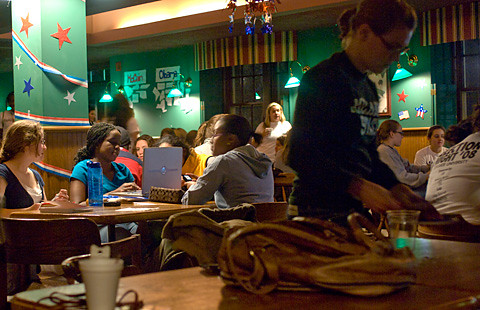Students, staff, and faculty members packed into Donovan’s Pub Tuesday night to watch election results and many returned, a bit bleary-eyed from staying up so late, this morning to attend a forum sponsored by the Department of Political Science.
Even though the presidential campaign lasted nearly two years, the final few hours of Election Night were electric for those at the pub watching to see which way the key swing states would actually swing.
Just after 11 p.m., as Sen. Barack Obama was projected to become the first African American to be elected president, the Illinois senator’s supporters cheered long and loud while Sen. John McCain’s backers tried to accept his defeat which, while perhaps foreshadowed earlier in the evening, was nonetheless hard to accept.
“I cannot imagine a better result. I have followed Senator Obama since his speech at the [2004] Democratic convention, read his books, and have worked on his campaign for almost two years,” said Kathleen Shaughnessy, president of şÚÁĎÍř’s College Democrats. “He is the new breed of politician, and his election is truly going to bring about change in our nation.”
 |
| Students hunker down as they wait for key election results Tuesday night at Donovan’s Pub. (Photo by Luke Connolly ’09) |
Andrew Spano, president of the College Republicans, offered another perspective
“I am disappointed for various reasons, but the people have spoken. That’s what’s so great about our country.” He added that the election should not have been about race or gender, but rather about policy and what is best for the country.
“Unfortunately, I think that common sense logic was partially lost during this election.”
|
Both Spano and Shaughnessy attended the Donovan’s Pub event, which was sponsored by their respective groups, Democracy Matters, Student Association for Voter Empowerment, şÚÁĎÍř Activities Board, and the Office of Undergraduate Studies.
Over lunchtime today at Persson Hall, Professor Nina Moore invited students to question the more than 15 professors in attendance and to hear their brief appraisals, which varied greatly, of the election.
One idea that gained some traction was that expressed by Professor Tim Byrnes, who said the Republican Party is “exhausted” after having been in control, with some gaps, essentially since 1968.
How the party redefines itself remains to be seen, said Professor Robert Kraynak, as the neo-cons, libertarians, and social conservatives need to hash out what the GOP should focus on.
Professor Nathaniel Richmond said the financial crisis that shook the nation just weeks before the vote was a key factor in McCain’s loss but not the only one. He argued that Obama’s defeat of Hillary Clinton in the Democratic primary was the critical juncture of the campaign, and that any Democrat could have defeated McCain in the general election.
Professor Joseph Wagner, however, called it an extraordinary election involving an extraordinary candidate — Obama.
Obama’s temperament, judgment, and priorities – not his race – were the critical factors for professor Michael Johnson. He noted that Obama was smart to pursue a 50-state campaign, a strategy re-introduced by Howard Dean, chairman of the Democratic National Committee, two years ago.
Professor Barry Shain called the election disappointing, and said he didn’t find either candidate appealing.
He criticized Obama, though, for being the candidate with “a radical past, a moderate present, and a fantasy future.”
Professor Anne Pitcher took exception to that later, saying Obama gave voters hope, and inspired younger votes in particular to become engaged.
“This election was a coming of age for young people who are becoming more politically active,” she said.